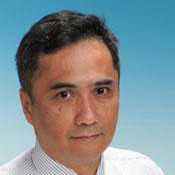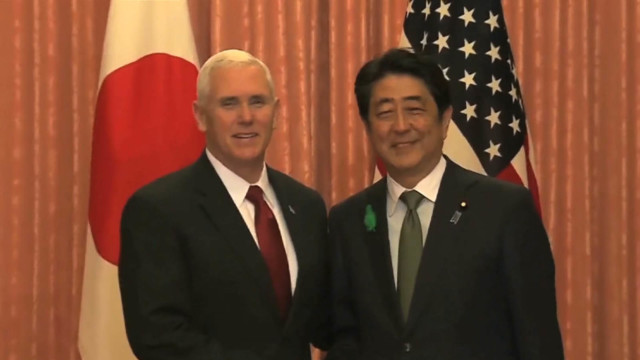U.S. Vice President Mike Pence is currently on his 10-day Asia-Pacific tour. After visiting the Republic of Korea, he is now in Japan.
He held talks with Prime Minister Shinzo Abe about Korean Peninsula tensions.
CGTN’s Terry Terashima reports.

Pence and Abe affirmed the need for tight security cooperation between Tokyo, Washington and Seoul. And also the importance of China’s role in resolving the DPRK nuclear and missile developments and bring about peaceful solutions. But until then both agreed that all options will be on the table.
However, the vice president had another important agenda; kicking off the U.S.-Japan Economic Dialogue. After U.S. withdrew from the Trans-Pacific trade pact, the U.S. has been keen to establish bilateral deals with Japan.
Japan had a $69 billion trade surplus with the United States last year, which Donald Trump criticized and is seeking to reduce America’s trade deficit with countries like Japan.
Officials said the new economic dialogue will be a mechanism to seek mutually beneficial trade deals.
“Friction is becoming a thing of the past and we are entering an era of cooperation,” Taro Aso, Japan’s deputy prime minister said.
“The Prime Minister Abe and Deputy Prime Minister Aso share our goal of a mutually beneficial economic relationship and we look forward to working with them through the U.S. Japan Economic Dialogue to achieve our vision of equal partnership,” Pence said.
The dialogue will base itself on three key policy pillars: Common Strategy on Trade and Investment Rules, Cooperation in Economic and Structural Policies, and in Sectoral Cooperation. All aimed at producing concrete results in a near term. Aso said that a second round of the Economic Dialogue will be at the end of the year.
The economic dialogue seemed to have started smoothly, but Japanese government officials are cautious that the U.S. would likely press hard for Tokyo to remove trade barriers.
These talks will be a tug of war between Japan seeking agreement similar levels with the TPP and the U.S. seeking to open the automotive and agriculture markets Japan.
Chris Hill on US and China’s policy on Korean Peninsula
To talk about what options there are for handling the DPRK, CGTN’s Asieh Namdar spoke with Ambassador Chris Hill via skype. He’s the Dean of the Josef Korbel School of International Studies at the University of Denver and former U.S. Ambassador to the ROK.
 CGTN America
CGTN America

